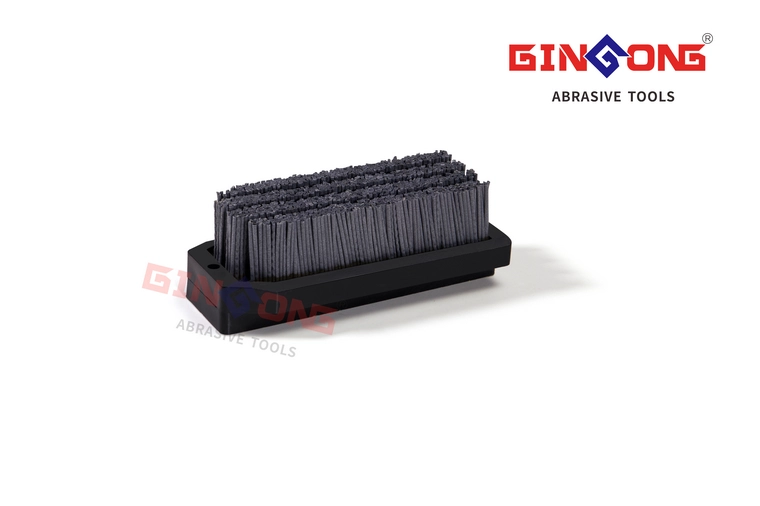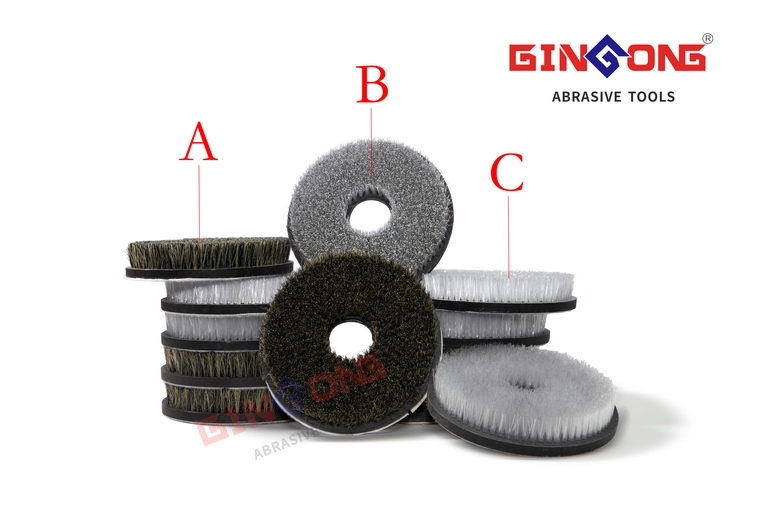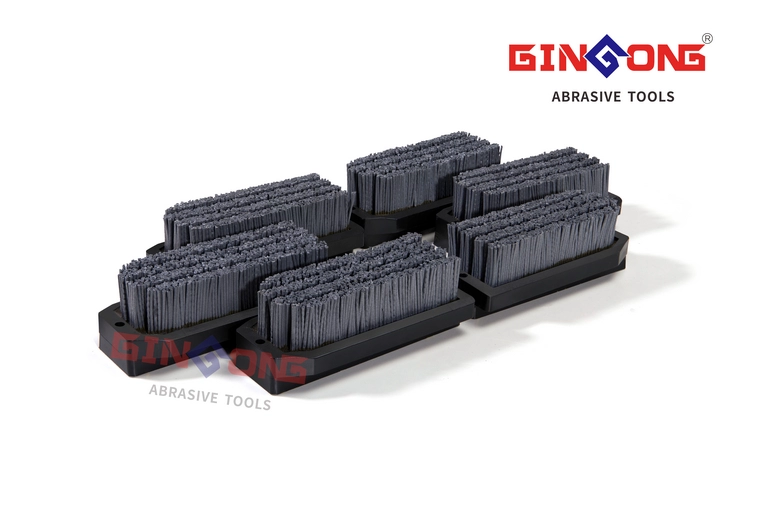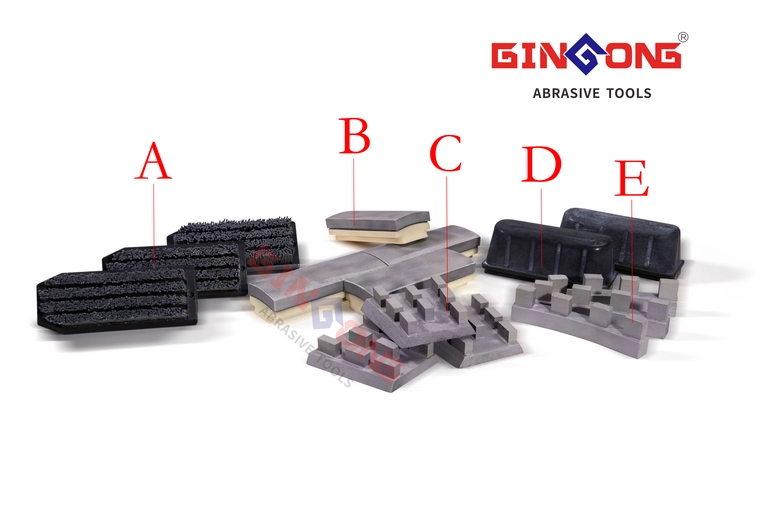In the realm of tile manufacturing, the integration of abrasive brushes in grinding machines represents a significant advancement in surface processing technology. These specialized brushes, which come in materials like nylon and steel, are adept at achieving a uniform and precise finish, pivotal for the subsequent application of sealants. However, the selection and deployment of these brushes require a nuanced understanding of both the equipment and tile properties. As we explore the transformative impact of abrasive brushes on efficiency and output quality in tile production, one must consider how these tools can be optimized further to meet evolving industry standards.



Abrasive brushes are essential tools in tile surface processing, designed to achieve various finishes and textures. These brushes come in various materials, each suited to specific tasks, offering precise control over the finishing process.
Among the common types, nylon brushes stand out for their versatility and safety. Unlike more abrasive materials, nylon brushes gently abrade the tile surface to remove imperfections and prepare it for further treatment without causing significant material removal. This makes them ideal for tasks requiring a light touch, such as creating a soft matte finish or cleaning delicate tile surfaces.
On the other hand, steel brushes are valued for their strength and durability. These brushes are capable of handling tougher jobs, such as removing old finishes, deep cleaning, or creating textured effects that require more aggressive action.
The robust nature of steel bristles allows them to endure the rigors of heavy and repeated use, making them a reliable choice for achieving consistent results across large surface areas.
Choosing the right abrasive brush—nylon for control and finesse, or steel for strength and durability—empowers professionals to tailor the tile surface processing to the specific needs of their project.

GINGONGS Matt abrasive brushes PYS-1
Integrating abrasive brushes into grinding machines significantly enhances the versatility and efficacy of tile surface processing. This integration is pivotal in leveraging advanced grinding technology to achieve superior surface finishing. By incorporating abrasive brushes, the grinding machines can handle a variety of textures and hardness without compromising on the quality of the finish.
The implementation process involves precise adjustment of the brushes to the grinding machinery, ensuring that the abrasive materials are in perfect alignment with the tiles' surfaces. This alignment is critical for achieving uniformity in texture and for preventing any damage to the tiles.
| Feature | Benefit |
|---|---|
| Customization | Brushes tailored to specific tile textures |
| Precision | High accuracy in surface contact |
| Compatibility | Suitable for various grinding machines |
These modifications not only streamline the tile surface processing but also extend the life of both the brushes and the grinding machines. The integration of abrasive brushes into grinding systems marks a significant step forward in the field of manufacturing technology, providing manufacturers with a tool that delivers both efficiency and control over the final product quality. This strategic setup enables optimal utilization of grinding technology for enhanced surface finishing outcomes.

Enhancing tile surface processing, abrasive brushes offer numerous advantages that contribute to both the efficiency and quality of the final product. These brushes are pivotal in achieving uniformity and precision, which are essential in high-standard applications. Their ability to adapt to various contours and surface specifics without compromising the integrity of the tiles allows manufacturers to maintain a high level of control over the finishing process.
The applications benefits of using abrasive brushes extend beyond just aesthetic enhancement. They also play a crucial role in improving the durability and functionality of tiles by removing imperfections and preparing surfaces for further treatment. This preprocessing step ensures better adhesion of sealants or glazes, which are vital for extending the lifespan of the tiles.
Material considerations are equally important when selecting abrasive brushes. The choice of materials affects not only the effectiveness of the brushing process but also the overall sustainability of the production cycle.
Opting for brushes that align with the physical properties of the tiles minimizes waste and enhances efficiency. This meticulous approach to material compatibility underscores the importance of abrasive brushes in the modern tile manufacturing industry, where precision, waste reduction, and control are paramount.

GINGONGS Stone grinding and polishing consumables S
To maximize the performance of abrasive brushes in tile surface processing, it is crucial to employ specific techniques that align with the material characteristics and desired finish of the tiles.
Mastery in application techniques and brush selection can significantly enhance efficiency and outcome. Here, we outline three key strategies:
Uniform application prevents uneven wear on the brush and helps achieve a consistent finish, avoiding patchiness which can detract from the aesthetic appeal of the tiles.
Proper maintenance and care of abrasive brushes are essential to extend their lifespan and ensure their effectiveness in tile surface processing.
Regular brush cleaning is crucial; it removes debris and prevents the accumulation of tile residue, which can impair the brush's function. After each use, brushes should be thoroughly cleaned with a recommended solvent that does not damage the bristle material. Allow the brushes to dry completely before their next use to avoid any potential rusting or degradation of the brush components.
Equally important is the method of brush storage. Storing brushes in a dry, ventilated area prevents moisture-related damage and prolongs their usability.
Brushes should be hung vertically to avoid bending the bristles, which can alter their effectiveness and cause uneven wear during operations. If vertical storage is not possible, ensure that the storage surface is flat and free of any sharp objects that could deform the brush.
Examining specific case studies highlights the impact of using abrasive brushes in tile surface processing across various industries.
By analyzing the application of abrasive brushes in real-world settings, we can derive valuable insights into their effectiveness and efficiency. This scrutiny allows for the optimization of processes and the enhancement of output quality, which are crucial for businesses aiming to maintain a competitive edge.
Here are three significant findings from various case studies:
These examples underscore the tangible benefits of employing abrasive brushes in tile surface processing operations.
Yes, abrasive brushes can be effectively utilized on both ceramic and porcelain tiles for tile cleaning and surface finishing, ensuring precise control over the textural outcome and enhancing the aesthetic appeal of the surfaces.
Yes, eco-friendly abrasive brush options are available, utilizing sustainable materials and biodegradable options, offering users greater control over environmental impact while maintaining effective surface processing capabilities for various tile types.
In the realm of workplace safety, proper operator training and the use of personal protective equipment are crucial. These measures effectively shield operators from potential hazards associated with the use of abrasive brushes.
Abrasive brushes, when properly maintained, can significantly enhance grinding machine efficiency and longevity. Regular brush maintenance ensures optimal performance and prevents excessive wear on machine components, promoting sustained operational control.
Yes, abrasive brushes can indeed be customized for specific tile patterns or textures, employing advanced customization techniques to ensure pattern compatibility and giving users precise control over the surface finish and aesthetic appeal.
In conclusion, abrasive brushes serve as the linchpin in the machinery of tile surface processing, efficiently smoothing the path towards enhanced productivity and precision. Their versatile integration with grinding machines ensures that each tile not only meets high standards of uniformity and durability but also sets the stage for improved sealant adhesion. Adhering to proper maintenance protocols, these tools can significantly elevate the quality of output, as demonstrated in various case studies, underscoring their indispensable role in the industry.
GINGONG in China offers high-quality diamond polishing and edge grinding tools alongside ceramic machinery accessories. Our integrated solutions cater to individual needs, ensuring optimal performance and efficiency. We lead the industry in ceramics polishing, emphasizing effectiveness, cost control, and environmental sustainability. With "Sanmo" machines and meticulous attention to detail, GINGONG delivers top-notch abrasive products, setting the standard for excellence.
Contact us for a free quote of your ideal ceramic tile abrasive brushess!
